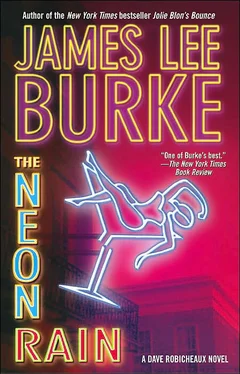Later, in the darkness of her bedroom, the sunset an orange and purple glow beyond the half-closed blinds, she lay against my chest and rubbed her hand over my skin.
"One day you'll have a quiet heart," she said.
"It's quiet now."
"No, it isn't. You're already thinking about the rest of the night. But one day you'll feel all the heat go out of you."
"Some people aren't made like that."
"Why do you think that?" she asked quietly.
"Because of the years I invested in dismantling myself, I was forced to learn about some things that went on in my head. I don't like the world the way it is, and I miss the past. It's a foolish way to be."
I left Annie's and drove over toward St. Mary's Dominican College, where Captain Guidry lived with his mother in a Victorian house not far from the Mississippi levee. It was a yellow house, in need of paint, and the lawn hadn't been cut and the lower gallery was overgrown with trees and untrimmed shrubs. The windows were all dark, except for the light of a television screen in the living room. I unlatched the picket gate and walked up the cracked walkway to the front porch. The porch swing hung at an angle on rusted chains, and the doorbell was the kind you twisted with a handle. I thought it was about time the captain seriously considered marrying the widow in the water department.
"Dave, what are you doing out here?" he said when he opened the door. He wore a rumpled sports shirt, slippers, and old slacks with paint stains on them. He held a cup with a tea bag in it.
"I'm sorry to bother you at home. I need to talk with you."
"Sure, come in. My mother just went to bed. I was watching the ball game."
The living room was dark, smelled of dust and Mentholatum, and was filled with nineteenth-century furniture. The furniture wasn't antique; it was simply old, like the clutter of clocks, vases, religious pictures, coverless books, tasseled pillows, and stacked magazines that took up every inch of available space in the room. I sat down in a deep, stuffed chair that was threadbare on the arms.
"You want tea or a Dr Pepper?" he said.
"No, thanks."
"You want anything else?" He looked at me carefully.
"Nope."
"Thataboy. Jimmie's still holding his own, isn't he?"
"He's the same."
"Yeah, I checked on him at noon. He's going to make it, Dave. If they get through the first day, they usually make it all the way. It's like something down inside of them catches a second breath."
"I'm in some serious trouble. I thought about just riding it out, then I thought about getting out of town."
He reached over from where he sat on the couch and clicked off the ball game.
"Instead, I figured I better face it now before it gets worse, if that's possible," I said.
"What is it?"
"I had to kill Philip Murphy last night in Biloxi."
I saw his jaw set and his eyes light angrily.
"I was going to bring him in," I said. "That's the truth, Captain. I let him go into the bathroom to take a leak, and he had a Walther taped inside the toilet tank. He called the play."
"No, you called the play when you started acting on your own authority, when you refused to accept the terms of your suspension, when you went as a vigilante into another state. I asked you at the hospital to have a little patience, a little trust. I guess those were wasted words."
"I respect you, Captain, but how much trust have people had in me?"
"Listen to what you're saying. Can you imagine making a statement like that in a courtroom?"
I felt my face flush, and I had to look away from his eyes.
"You still haven't told me everything, though, have you?" he said. "No."
"You left the scene and you didn't report it?"
"Yes."
"What else?"
"I think Purcel killed Bobby Joe Starkweather."
"What for?"
"I don't know."
"Maybe he was just riding around in St. Charles Parish one morning and decided he wanted to blow away a redneck," the Captain said.
"There was a witness. I have her name and where she works."
"But you didn't bother telling this to anyone before?"
"She's a doper and a hooker, Captain. Her brains are as soft as yesterday's ice cream. I didn't know what would happen to her if they kept her as a material witness, either."
"I'm having a hard time assimilating all this, Dave. I hate to tell you this, but this Purcel business sounds like it came out of a bottle. Maybe his personal problems are about to screw up his career with the department, but he's not an assassin, for God's sakes."
I felt tired, empty, my options all spent, and all of it for no purpose whatsoever. The captain was a good man. I didn't know what I had expected of him, actually. In going to his house with my strange stories, I had given him even fewer alternatives than I had myself.
"Give me the address," he said. "I'm going to call the Biloxi police department. Then we need to go down to the station, and I think you should call an attorney."
He made the long-distance call, and I listened glumly while he talked with someone in their homicide division. I felt like a child whose errant behavior would now have to be taken over by a group of bemused authority figures. The captain finished and hung up the phone.
"They're sending a car out there and they'll call me back," he said.
I sat in the silence. "Did that black kid ever find anything in the mug books?"
"No, he was too scared, poor kid. We found out he's a little bit retarded, too. You don't think Murphy pulled the trigger?"
"No."
The captain blew air out of his nose. His fingers made a design on the arm of the couch as we sat in the gloom.
"Captain, did you hear anything about Didi Gee being indicted?"
"No, but you know how they are in the prosecutor's office. They dummy up on us sometimes, particularly when they're thinking about a roll of drums on the six-o'clock news. What did you hear?"
"He thinks he's going to be indicted."
"He told you this? You've been talking with Didi Gee?"
"He asked me out to Mama Lido's. He gave me the line on Murphy."
"Dave, I'm advising you at this point that you should be careful of what you tell me."
"I believe he thinks he might actually go to Angola."
"If the prosecutor's office is taking Didi Gee before the grand jury, it doesn't have anything to do with homicide. We had two cases I thought we could tie to his tail, and the prosecutor sat on his hands until one witness blew town and another time a clerk threw away a signed confession. You remember two years ago when somebody cut up a bookie named Joe Roth and stuffed him into the trash compactor in his own house? The next-door neighbor heard a Skilsaw whining in the middle of the night, and saw two guys leave the house at dawn, carrying a bloody paper sack. We found out later it contained the overalls they wore while they sawed up Roth's body. The neighbor picked out one of Didi Gee's hoods from a lineup, the guy had no alibi, his car had blood on the seat, he was a two-time loser and psychotic who would have sold Didi Gee's ass at a garage sale to stay out of the electric chair. But the prosecutor's office messed around for five months, and our witness sold his house at a loss and moved to Canada. So I can't take their current efforts too seriously. If they want to put the fat boy away, they should be talking to us, and they're not.
"I'm not sure what you're getting at, Dave, but it doesn't make any difference. It's our territory now, not yours, even though we're talking about your brother. What's that word they use when they're talking about characters in Shakespeare's plays?"
"Hubris?"
"Yeah, that's the word. Pride, a guy not knowing when he should sit one out. I think maybe that's the origin of our problem here."
Captain Guidry turned the ball game on and pretended to watch it while we waited for the call. He was clearly uncomfortable. I suppose he was thinking he might actually have to arrest me. Finally he got up, went into the kitchen, and brought us back two bottles of Dr Pepper.
Читать дальше












